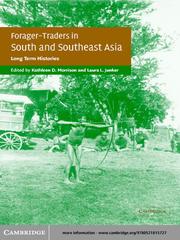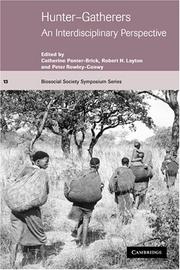| Listing 1 - 10 of 156 | << page >> |
Sort by
|
Book
Year: 1995 Publisher: [Place of publication not identified] : IET,
Abstract | Keywords | Export | Availability | Bookmark
 Loading...
Loading...Choose an application
- Reference Manager
- EndNote
- RefWorks (Direct export to RefWorks)
Book
ISBN: 1789696860 9781789696868 Year: 2020 Publisher: Oxford : Archaeopress Publishing,
Abstract | Keywords | Export | Availability | Bookmark
 Loading...
Loading...Choose an application
- Reference Manager
- EndNote
- RefWorks (Direct export to RefWorks)
Foragers were present in the Limpopo Valley (South Africa) before the arrival of farmers and not only witnessed but also participated in local systems leading to the appearance of a complex society. Despite numerous studies in the valley, forager involvement in socio-political developments has been, until now, largely ignored.
Book
ISBN: 9781107024878 9781107607613 1107607612 1107024870 9781139176132 9781107341722 1107341728 1139176137 129940894X 9781299408944 1107357594 9781107357594 1107255538 9781107255531 1107347971 9781107347977 1107345472 9781107345478 1107344220 9781107344228 110723624X Year: 2013 Publisher: Cambridge : Cambridge University Press,
Abstract | Keywords | Export | Availability | Bookmark
 Loading...
Loading...Choose an application
- Reference Manager
- EndNote
- RefWorks (Direct export to RefWorks)
"In this book, Robert L. Kelly challenges the preconceptions that hunter-gatherers were Paleolithic relics living in a raw state of nature, instead crafting a position that emphasizes their diversity, and downplays attempts to model the original foraging lifeway or to use foragers to depict human nature stripped to its core. Kelly reviews the anthropological literature for variation among living foragers in terms of diet, mobility, sharing, land tenure, technology, exchange, male-female relations, division of labor, marriage, descent, and political organization. Using the paradigm of human behavioral ecology, he analyzes the diversity in these areas and seeks to explain rather than explain away variability, and argues for an approach to prehistory that uses archaeological data to test theory rather than one that uses ethnographic analogy to reconstruct the past"--
Hunting and gathering societies. --- Hunting and gathering societies --- Food gathering societies --- Gathering and hunting societies --- Hunter-gatherers --- Hunting, Primitive --- Ethnology --- Subsistence hunting --- Social Sciences --- Archeology
Book
ISBN: 1003086837 1000189538 1003086837 1000182908 1472555775 1299154670 1472504135 9781472504135 1472504143 9781472504142 9781472555779 9781003086833 9781000182903 9781299154674 9781780932026 1780932022 9781472504142 1472584023 9781472584021 Year: 2013 Publisher: Routledge
Abstract | Keywords | Export | Availability | Bookmark
 Loading...
Loading...Choose an application
- Reference Manager
- EndNote
- RefWorks (Direct export to RefWorks)
This book provides a basic introduction to key debates in the study of hunter-gatherers, specifically from an anthropological perspective, but designed for an archaeological audience. Hunter-gatherers have been the focus of intense anthropological research and discussion over the last hundred years, and as such there is an enormous literature on communities all over the world. Yet, among the diverse range of peoples studied, there are a number of recurrent themes, including not only the way in which people make a living (hunting, gathering and fishing) but also striking similarities in other areas of life such as belief systems and social organisation. These themes are described and then explored through archaeological case-studies. The overarching theme throughout the volume is the use of ethnographic analogy, and how archaeologists should be critical in its use.
Hunting and gathering societies. --- Archaeology. --- Antiquities, Prehistoric.
Book
ISBN: 9781931745642 9781931745635 1931745633 1931745641 Year: 2011 Volume: 5 Publisher: Los Angeles Cotsen Institute of Archaeology Press
Abstract | Keywords | Export | Availability | Bookmark
 Loading...
Loading...Choose an application
- Reference Manager
- EndNote
- RefWorks (Direct export to RefWorks)
Hunting and gathering societies. --- Hunting and gathering societies --- Social networks. --- Memory --- Information resources. --- Social aspects.

ISBN: 1107134145 1280419954 0511169779 1139148281 051106506X 051105873X 0511331185 0511489633 0511073526 9780511065064 9780511058738 9780511073526 9780521815727 052181572X 9780521016360 0521016363 9781280419959 9786610419951 6610419957 0521016363 9780511489631 0511094337 9781107134140 9780511169779 9781139148283 9780511331183 Year: 2002 Publisher: Cambridge : Cambridge University Press,
Abstract | Keywords | Export | Availability | Bookmark
 Loading...
Loading...Choose an application
- Reference Manager
- EndNote
- RefWorks (Direct export to RefWorks)
In both South and Southeast Asia, many upland groups make a living - in whole or part - through gathering and hunting, producing not only subsistence goods but commodities destined for regional and even world markets. These forager-traders have had an ambiguous position in ethnographic analysis, variously represented as relics, degraded hunter-gatherers, or recent upstarts. Forager-Traders in South and Southeast Asia adopts a multidisciplinary approach to these groups, presenting a series of comparative case-studies that analyse the long-term histories of hunting, gathering, trading, power relations, and regional social and biological interactions in this critical region. This book is a fascinating and important addition to the current 'revisionist' debate, and a unique attempt to re-conceptualize our knowledge of forager-traders within the surrounding context of complex polities, populations and economies in South and Southeast Asia.
Hunting and gathering societies --- Food gathering societies --- Gathering and hunting societies --- Hunter-gatherers --- Hunting, Primitive --- Ethnology --- Subsistence hunting --- History. --- Southeast Asia --- HISTORY. --- Hunting and gathering societies. --- History --- Southeast Asia. --- Social Sciences --- Archeology
Book
ISBN: 1003030084 1003030084 1000655741 100065575X Year: 2023 Publisher: London ; New York : Routledge, Taylor & Francis Group,
Abstract | Keywords | Export | Availability | Bookmark
 Loading...
Loading...Choose an application
- Reference Manager
- EndNote
- RefWorks (Direct export to RefWorks)
"Considering the interactions between developments in open data and data journalism, Data for Journalism offers an interdisciplinary account of this complex and uncertain relationship in a context of tightening the control over data and weighing transparency against privacy. As data has brought both promise and disruptive changes to societies, the relationship between transparency and accountability has become complicated, and data journalism is practised alongside the contradictory needs of opening up and protecting data. As well as exploring the benefits of data for journalism, this book addresses the uncertain nature of data and the obstacles preventing data from being fluently accessed and properly used for data reporting. Because of these obstacles, it argues individual data journalists play a decisive role in using data for journalism and facilitating the circulation of data. Frictions in data access, newsrooms' resources and cultures and data journalists' skill and data literacy levels determine the degree to which journalism can benefit from data, and these factors potentially exacerbate digital inequalities between newsrooms in different countries and with different resources. As such, the author takes an international perspective, drawing on empirical research and cases from around the world, including countries such as the UK, the US, Germany, Sweden, Australia, India, China and Japan. Introducing a new dimension to the study of developments in journalism and the role of journalism in society, Data for Journalism will be of interest to academics and researchers in the fields of journalism and the sociology of (big and open) data"--
Journalism --- Electronic news gathering. --- Computer-assisted reporting. --- Data processing.
Book
ISBN: 8385463216 Year: 1993 Publisher: Poznan : Institute of archaeology and ethnology, polish academy of sciences,
Abstract | Keywords | Export | Availability | Bookmark
 Loading...
Loading...Choose an application
- Reference Manager
- EndNote
- RefWorks (Direct export to RefWorks)
Excavations (Archaeology) --- Hunting and gathering societies --- Stone age --- Chwalim Site (Poland) --- Poland --- Antiquities. --- Chwalim Site (Poland). --- Civilization --- Food gathering societies --- Gathering and hunting societies --- Hunter-gatherers --- Hunting, Primitive --- Ethnology --- Subsistence hunting --- Antiquities --- Paleolithique --- Mesolithique --- Pologne

ISBN: 0521776724 9780521776721 9780521772105 0521772109 Year: 2002 Publisher: Cambridge : Cambridge university press,
Abstract | Keywords | Export | Availability | Bookmark
 Loading...
Loading...Choose an application
- Reference Manager
- EndNote
- RefWorks (Direct export to RefWorks)
Hunting and gathering societies --- Research. --- men --- Cueillette --- Picking --- Morphogénèse --- Food gathering societies --- Gathering and hunting societies --- Hunter-gatherers --- Hunting, Primitive --- Ethnology --- Subsistence hunting --- Research --- Hunting --- Évolution --- evolution --- Morphogenesis --- Sociology --- History --- Demography --- socioeconomic organization --- Social anthropology --- Chasseurs-cueilleurs --- Recherche --- evolution.
Book
ISBN: 9780199551224 0199551227 9780198831044 Year: 2014 Publisher: Oxford: Oxford university press,
Abstract | Keywords | Export | Availability | Bookmark
 Loading...
Loading...Choose an application
- Reference Manager
- EndNote
- RefWorks (Direct export to RefWorks)
For more than a century, the study of hunting and gathering societies has been central to the development of both archaeology and anthropology as academic disciplines, and has also generated widespread public interest and debate. The Oxford Handbook of the Archaeology and Anthropology of Hunter-Gatherers provides a comprehensive review of hunter-gatherer studies to date, including critical engagements with older debates, new theoretical perspectives, and renewed obligations for greater engagement between researchers and indigenous communities. Chapters provide in-depth archaeological, historical, and anthropological case-studies, and examine far-reaching questions about human social relations, attitudes to technology, ecology, and management of resources and the environment, as well as issues of diet, health, and gender relations — all central topics in hunter-gatherer research, but also themes that have great relevance for modern global society and its future challenges.The Handbook also provides a strategic vision for how the integration of new methods, approaches, and study regions can ensure that future research into the archaeology and anthropology of hunter-gatherers will continue to deliver penetrating insights into the factors that underlie all human diversity
Ethnology. Cultural anthropology --- Archeology --- Prehistory --- Hunting and gathering societies --- Excavations (Archaeology) --- Anthropology, Cultural. --- Archäologie. --- Ethnologie. --- Ethnology. --- Excavations (Archaeology). --- Hunting and gathering societies. --- Wildbeuter. --- Archäologie.
| Listing 1 - 10 of 156 | << page >> |
Sort by
|

 Search
Search Feedback
Feedback About UniCat
About UniCat  Help
Help News
News